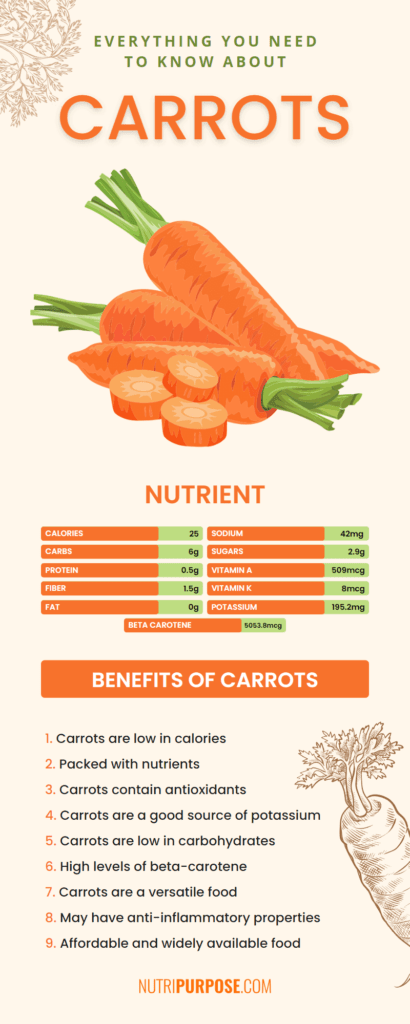- Carrots are rich in beta-carotene, which is an essential nutrient for healthy skin
- They have a long history of cultivation and have been used both as a food and for medicinal purposes
- They are packed with nutrients, including carotenoids, which can be converted into vitamin A in the body
- pH levels in food can have an impact on your health
- They have numerous benefits, including being low in calories, packed with antioxidants, easy to digest, and safe for diabetics
Carotene is an essential nutrient for healthy skin, and you should consider introducing more beta-carotene foods into your alkaline diet.
Carrots are rich in nutrients among the many beta-carotene fruits and vegetables.
Other carotene foods include spinach, lettuce, tomatoes, sweet potatoes, broccoli, and cantaloupe.
Want to know more about carrots and carotene?
Looking for the most carotene-rich carrot?
Look for orange carrots with the most intense color!
In our detailed blog below, you will find everything you need to know about this crunchy alkaline staple – from the health benefits of carrots to a few mouth-watering recipes to try.
Here, you can find more information on carrots, their carotene values, and their essential role in an alkaline diet.
Physical Description of Carrots
Carrots get their bright orange color from them, you guessed it, carotene values.
The name “beta-carotene” comes from the Greek word “beta” and the Latin word “carota”.
However, it is worth mentioning that it is not only found in carrots but also in other colorful fruits, vegetables, and plants.

History and Production
Carrots are a staple in many diets worldwide, and for good reason.
They are full of vitamins (especially vitamin K), minerals, and antioxidants that help promote healthy skin, hair, and overall health.
Carrots were first domesticated in East Asia more than one thousand years ago.
They were mainly used as food but also had some medicinal benefits.
Today, carrots are produced all over the world and are available year-round.
However, they are most popular during winter because their color makes them visually appealing on store shelves!
The first known evidence of carrot cultivation dates back to 3000 BC in Afghanistan and Iran.
At this time, people were growing crop varieties such as maize, peanuts, beans, and pumpkins.

It is thought that carrots were originally consumed as part of a ceremonial diet or used for medicinal purposes.
As carrot production increased worldwide, so did its popularity as a food item.
Carrot cultivation soon spread to Europe and North America, but it was not until the mid-19th century that commercial growers began cultivating them commercially for their edible roots alone.
Today, carrots are grown worldwide, including in Canada, China, India, Australia, Mexico, Africa, Argentina, and Chile.
Nutrient Facts of Beta Carotene
Carrots are one of the best sources of carotenoids, which is important for your health.
They help to prevent diseases like cancer and age-related eye health problems.
One cup (120 grams) of cooked carrots provides about 20 % of the recommended daily intake (RDI) for carotenoids.
Carotenes are converted into vitamin A when you eat them, and vitamin A helps protect your eyes, skin, and other organs from damage.
Carrots also contain lutein and zeaxanthin – two other important antioxidants for your health.
Lutein helps protect your eyesight, while zeaxanthin helps protect your vision against the harmful effects of ultraviolet light.
Carrots also contain potassium, magnesium, phosphorus, and other minerals.
They are also a good vitamin B6, thiamine, and niacin source.
It is worth mentioning that carrots are relatively high in sugar yet have no cholesterol or saturated fat.

What Does Acid/Alkaline Mean?
Acid and alkaline are terms used in chemistry to describe the pH of a solution.
The higher the number, the more alkaline it is.
Solutions with a pH of 7 are neutral, while the solutions below are more acidic.
Essentially, the pH scale refers to how acidic (low pH) or alkaline (high pH) the food is.
Acidic food can cause problems such as tooth erosion and body inflammation, while more alkaline foods can help improve overall health by promoting gastrointestinal balance.
Foods that fall into either of these two categories generally have labels printed on them specifying their acidity or alkalinity.
The Problem with Being Too Acidic
Acid/alkaline diets are a type that proponents believe can help improve health.
These diets emphasize eating foods that are low in acid and high in alkaline properties.
The theory is that by balancing the levels of these acids and bases in the body, various problems can be improved or even prevented altogether.
Carrots can positively affect your health in an alkaline diet, even if you’ve just transitioned into an alkaline diet.
Carrots are slightly more acidic than other foods in our journal, but they cannot cause acid reflux.
Too much acid in your diet can have negative consequences for your health.
Over time, an acidic environment can damage tooth enamel and dentin as the acids leach minerals out of the teeth.
This is a grim picture indeed.
It can also trigger problems with gingivitis, including inflammation and bleeding.
It may even lead to dental caries (tooth decay) in extreme cases.
Finally, an overly acidic digestive system is linked with a higher risk of developing certain types of cancer.
How do you know when your diet is too acidic?
The pH scale measures the acidity level of foods and beverages.
Foods that are high on the pH scale (above 7) are more alkaline than those that are low on the pH scale (below 7).
So, how do you find foods that fall into this category?
If your pH level is out of balance, you may need to change how you eat and live.
There are many ways to alkalinize the body without relying on pharmacological interventions.
Some basic tips include:
- Eat plenty of fresh produce that contains magnesium, potassium, and other essential nutrients such as carotene – these foods help maintain healthy blood pressure levels and promote better skin health. Carrots are famous as the most carotene-rich root vegetables, and you can even opt for carrot juice.
- Avoid processed foods, sugary drinks, excessive alcohol consumption (especially wine), tobacco products, and caffeine if you want to stay alkaline.
Ph Value of Carrots
As we’ve seen, all vegetables – including carrots – vary in pH due to factors like soil composition and irrigation preferences.
Carrots are a healthy option for adding some color to your diet.
Normally, leafy greens have more alkalinity than others because they contain more chlorophyll.
This means that green veggies are usually safer to eat since they tend to be slightly less acidic (which also means there’s less chance of stomach problems).
Carrots are not quite alkaline – they vary between a pH of 5.55 and 7, putting them in the neutral category.
Ideally, it would be best not to eat carrots below a pH of 6.

Benefits of Beta Carotene in Carrots
A common misconception is that pH levels concerning health and food safety don’t matter.
What a misconception, indeed!
Unsafe foods with high acidity levels can harm your body in several ways: they can cause stomach problems, damage the lining of your gut (known as gastritis), increase your risk of cancer, and decrease fertility rates.
Let’s look at several reasons why carrot consumption may be particularly beneficial for people following an alkaline diet:
- They’re low in calories: One cup of raw carrots contains just 37 calories (1/4 of 1% of your daily calorie intake). This makes them a healthy option for people trying to lose or maintain their current weight loss progress.
- They’re packed with antioxidants: Carrots contain more than 30 different antioxidants, including phytochemicals that have been shown to protect against cancer cells and lower inflammation levels throughout the body. One study found that eating three cups daily reduced inflammation markers by 67%.
- They’re easy to digest: Carrots are highly soluble in water and easily break down into glucose and galactose molecules once they enter the small intestine.) This means they won’t cause bloating or gas like other culprits on our list. As an extra perk, they are also loaded with fiber – a double whammy to keep you full and regular.
Carrots are also marked safe for diabetes who need to watch their blood sugar levels actively.
It has a shallow glycemic index and is a non-starch.
This is good news for all keto dieters out there.
Carrot Recipes
Changing your diet can be tough, but it’s an essential investment in your health.
One of the best ways to start is by adopting an alkaline diet.
Carrots are a great way to get your daily dose of essential nutrients while lowering your risk of heart disease and other chronic illnesses.
Will Rogers was wrong:

Some guy invented Vitamin A out of a carrot. I’ll be he can’t invent a good meal out of one.
Will Rogers
Here are two delicious carrot recipes that will help make the transition easier:
Carrot Soup With Dill
Looking for a delicious and nutritious soup recipe?
This dish contains fiber, vitamins A and C, iron, and carotene.
Plus, it’s easy to make and yummy, perfect for a cold winter day.

Ingredients:
- 2 carrots, peeled and chopped into small pieces
- 1 onion, chopped into small pieces
- 3 cups vegetable broth or water
- 1 tablespoon olive oil or butter
- 1 teaspoon salt (or to taste)
- 1/4 cup fresh dillweed leaves OR 1 teaspoon dried dillweed leaves
- Freshly ground black pepper to taste
Directions:
In a large pot over medium heat, saute the onions in the oil until they are softened.
Add the carrots and vegetable broth.
Bring to a boil, reduce heat to a low simmer, and cook until the vegetables are very tender (about 20 minutes).
Stir in the fresh dills, or stir in one teaspoon of dried herbs.
Season with pepper to taste before serving hot.
Roasted Carrot Salad with Honey Drizzle and Mint Dressing
This delicious salad is a perfect way to celebrate the arrival of spring!
The honey and mint dressing adds a touch of sweetness and freshness, while the roasted carrots give it an earthy flavor that pairs perfectly with the other ingredients.
This salad can be prepared in just minutes, ideal for on-the-go lunches or quick dinners.

Ingredients:
- 1 lb. raw carrot, peeled and sliced into thin strips
- 3 Tbsp olive oil divided
- Salt & pepper to taste
- For the Honey Drizzle:
- 1 cup honey
- 2 tsp apple cider vinegar
- ¼ tsp salt
- Pepper to taste For Mint Dressing:
- ½ cup sour cream or yogurt (or Greek yogurt) whisked until smooth (Greek yogurt is alkaline-forming despite having a low pH level of 4.4-4.8)
- 3 large sprigs of fresh mint leave chopped
Directions:
Preheat oven to 400 degrees Fahrenheit.
In a large bowl, toss carrots and one tablespoon of olive oil, salt & pepper.
Spread on a baking sheet and roast for 25 minutes until slightly browned.
Meanwhile, make the dressing by mixing honey, apple cider vinegar, and salt and pepper until desired consistency is achieved; set aside extra for later).
Transfer the carrots onto the serving dish; top with remaining ingredients, then drizzle with honey or dressings as desired. Enjoy!
Plan your Dietary Meal
Orange carrots, purple carrots, it doesn’t matter!
As long as you get your dose of beta carotene, you can munch down any variation you like – as long you keep the pH in check.
We covered everything you need to know (in a nutshell) about carrots and carotene to make it easier for you.
The transition into a low-acidic diet doesn’t have to be tough, and with all the health benefits you can unlock, be prepared to level up to a healthier, better you.

Reinette Robbertze is a highly qualified professional in the health and nutrition industry, having completed both Journalism and Nutrition diplomas. With a remarkable portfolio of health blogs and magazine articles to her name, Reinette’s writing is fueled by her genuine passion for healthy living. Drawing on her academic background, Reinette delivers authentic and insightful information to her readers. Her engaging writing style, blended with personal anecdotes, creates an immersive experience that keeps readers engaged and informed. Keep following her work for the latest updates and informative articles on health and nutrition.









